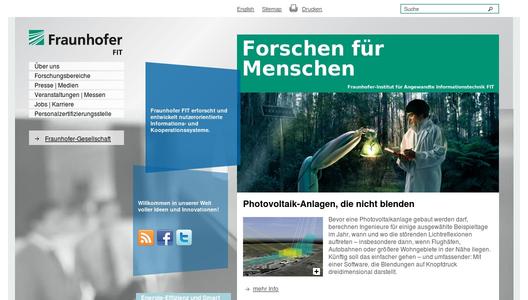Most manufacturing companies have by now taken the 'easy' steps to optimize energy consumption, e.g. by replacing old, energy-guzzling machines by more efficient ones. Pneumatic drives are another example: Here improvements that are relatively easy to implement lead to energy savings of ten percent or more.
Beyond that, potential efficiency improvements in manufacturing can be realized only if the production as a whole is examined from a process-oriented perspective. For this problem Fraunhofer FIT has developed a solution. The system is a software platform based on a service-oriented architecture. It makes it easy to link up existing devices and sensors; additional measuring technology can be integrated efficiently. As it can be extended flexibly, the software platform supports a pragmatic approach. At the start the existing data sources are used. Additional sensors can be added later on, as needed.
First a manufacturing process is represented in a BPMN process model. The machines and sensors involved in a particular process step, and what identifies its start and end, are defined. This makes it possible to capture the data separately for each process step and optimally adjusted to the task at hand.
The data is aggregated as required and sent to existing IT business systems like an ERP or a MES. This makes it possible to optimize manufacturing processes or to identify machines that are not optimally utilized. In the acquisition process, the data is analyzed to identify situations that require immediate reaction. Then other IT systems or workers responsible for solving the problem are notified ad hoc.
"It is a real challenge to integrate the plethora of devices involved, coming from many different manufacturers and using diverse communication protocols and interfaces, in a coherent system and to make the massive amounts of data they generate usable in a company's business IT systems. With our software platform, this can be done easily," says Dr. Markus Eisenhauer, head of Fraunhofer FIT's department User-Centered Computing.
The system offers a broad range of potential applications. In addition to sensors, it can integrate actuators that, depending on the data just measured, trigger specific changes in the manufacturing process. As an example, the system could send a message when a sensor detects vibrations that may indicate an impending breakdown of a machine. This message might be displayed on a mobile device of the worker(s) responsible for this particular machine or it might be sent to a control room. In combination with business IT systems or specialized analysis software, our monitoring system makes manufacturing processes transparent and helps identify areas for further optimization that were not visible before.
At HANNOVER MESSE, April 8 – 12, 2013, Fraunhofer FIT demonstrates the monitoring system, using a production line in the automobile industry as an example. Meet our experts in hall 17 / booth F14.

